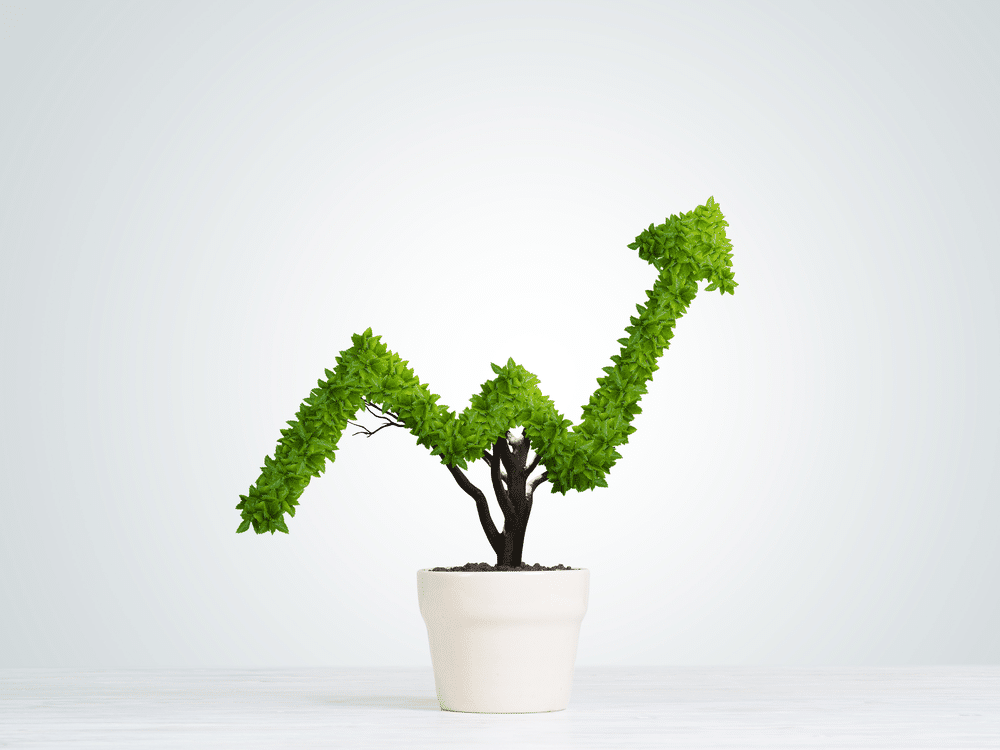What is sustainability in business? Yes, it’s carrying out your business operations in a way that’s in harmony with the environment and your community. And it involves making decisions that benefit society and being mindful of future generations.
Those elements are undoubtedly at the heart of sustainability. They weigh on the conscience and drive us to be better.
But sustainable practices in business do more than benefit the communities and ecosystems outside that organization’s office walls. Sustainability can extend to business and set your business up for long and prosperous life.
Is it surprising that when business owners show respect for other life forms, they enjoy symbiosis? We think not. The laws of science are powerful enough to extend to a cosmetics company in Australia, a software developer in New Zealand, or a jewelry brand in the United States. When you help others live a more fulfilling life, you’ll likely find that you enjoy the same results.
Given this win-win, it makes perfect sense that sustainability has gone from a fringe concept to a booming trend within the international business world. As Andrew Winston writes in the Harvard Business Review:
The discussion around what most now call “ESG” (environmental, social, and governance) has become far more common than I’ve ever seen in my 20 years in the field. It’s now ubiquitous, and some data backs that up. Virtually all of the world’s largest companies now issue a sustainability report and set goals; more than 2,000 companies have set a science-based carbon target; and about one-third of Europe’s largest public companies have pledged to reach net zero by 2050. On the social side of the agenda, companies have been expanding diversity and inclusion efforts, committing funds to fight racial inequity, and speaking out on societal issues they used to avoid. None of this equates with actual action to reduce emissions or tackle inequality, but it’s clearly not fringe anymore.
What we’re seeing is a recalibration, with businesses finally rising up to match the priorities of their customers. And the results will benefit everyone.
The Case for Sustainable Business Practices
Let’s set aside the heart-warming aspects of sustainability for a minute. In the grand scheme of things, of course, it’s only these things that matter. But it’s also relevant for entrepreneurs to understand exactly how sustainability can be a win-win. How helping to save the world can lead to substantial benefits in “your own little world.”
Even with the best intentions, it can be difficult not to revert to the traditional mindset where profits and survival are the priorities. But every step you take toward sustainability can bring financial advantages to your business. Of course, there will often be an initial cost as with any other type of investment. But these short-term effects typically give way to long-term benefits.
Here are some of the key ways your business can directly benefit from sustainable initiatives.
Qualifying for Tax Benefits and Rebates
Your local and federal government would love for your business to move toward sustainability. So they often offer tax credits and rebates to promote the purchase and installation of more efficient systems, appliances, and materials for your business. For example, you could receive financial benefits for installing solar panels or a more efficient water heater. Likewise, upgrading the thermostat or insulation in your office could qualify you for a reward.
You’ll need to do your research to find out what incentives are available at your local, state, and federal level. Business owners who sit around waiting for the incentives to come directly to them will always be left out.
It’s impossible to always stay on top of all the potential incentives out there, so don’t fret if you learn of one after the fact. Some of these programs will allow you to submit an application up to 6 months after you’ve made an improvement for your business.
Savings on Utilities
Don’t forget the money you’ll save each month by making some of the upgrades referenced above. For example, more efficient lighting immediately translates into lower electric bills. Low-flow faucets and toilets decrease your water expenses. Even these moderate savings add up when you consider that you’ll be enjoying them monthly.
On a larger scale, you might consider solar panels, upgraded insulation, or energy-efficient windows to further reduce your monthly utility bill. You can often see more substantial savings when tackling these initiatives.
If you don’t know where to start, reach out to your utility company and ask if they offer free energy audits. These on-site visits usually don’t last more than 1-2 hours and can reveal the most promising opportunities to reduce your expenses.
Broader Range of Opportunities
A commitment to sustainability is often a precursor to obtaining new business opportunities. Did you know that many private businesses and government agencies have “green” standards that must be met before conversations can even begin?
This green standards trend will only increase in the coming years, so it’s advisable to be proactive now so that you don’t have to play catchup with your competitors. Establishing yourself as a champion of sustainability ensures that more doors open for you… and what business owner wouldn’t want that?
More Productivity
Making your business more efficient has a cascading effect on your productivity. The more streamlined you are, the more work can get done in a shorter period of time.
For example, Walmart sought to embrace sustainability by improving the efficiency of its fleet. This was a tall order because their massive fleet has more than 6,000 tractors and 60,000 trailers.
The results of these ongoing efforts are still rolling in, but a snapshot from 2005 to 2015 shows just how impactful they’ve already been. By improving their fleet’s routing, driving, and load methods, Walmart moved 1 billion more cases while reducing total miles driven by 460 million.
Even if you don’t command a fleet the size of Walmart’s, you can create meaningful savings through process improvements within your business. Examples include using power save mode for all your electronic devices, choosing power strips with sleep mode, installing a smart thermostat, and adding motion detectors to overhead lights.
Regulation Compliance
At the local and federal level, governments are unveiling new business regulations to conserve resources and limit the environmental impact. Taking strategic steps toward sustainability helps you avoid penalties or even business disruption, that might come from violating new regulations.
Improve Your Hiring
Your sustainable business practices will bolster your public image, which pays dividends when searching for job candidates. This will be increasingly important in the future, as research shows that individuals from the millennial and Generation Z generations care much more about the environment than past generations.
Consider these statistics:
- 71% of millennials say addressing climate change is a top priority
- 67% of Generation Z say addressing climate change is a top priority
If your business has focused on sustainability, you’ll be able to connect with more talent in your hiring searches. More importantly, the conscientious culture you promote will boost engagement and help retain employees.
Attract New Investors
Many investors work exclusively with sustainably-minded businesses. A large part of this approach can be attributed to authentic concern for the environment. But it stands to reason that investors also need to be selective in this realm, as negative stories related to businesses they’re connected to will damage their brand as well. If your business takes community health and environmental impact seriously, you’ll be viewed as a much safer investment.
Improved Customer Loyalty
We all know that it’s more cost-effective to retain a customer than attract a new one. Well, you can simultaneously attract and retain them by communicating your sustainability efforts publically. These eye-popping statistics tell the tale:
- 80% of consumers say that sustainability is a priority
- 60% will change their shopping habits to enhance sustainability
- 70% will pay a premium price for brands that are sustainable
It’s always easier to build a strong customer base when your business practices address a top priority of 80% of individuals who interact with you.
More Innovation
Seeking to make less of an impact on the environment will always make more of an impact on your level of innovation. Perhaps you’ll discover ways to manufacture your products faster and more affordably. Or, like Walmart, your efforts could lead to more effective deliveries.
The point is that innovation doesn’t just walk up and shake your hand. You need to diligently pursue these improvements and then you’ll be able to enjoy the benefits of an innovative business.
Balancing Social Responsibility and Success
Each of these benefits of sustainability benefits your business in multiple ways. Aside from the peace of mind that comes from doing your part to save the world, what does it all add up to? Better business practices and improved financial performance.
The days of business owners being forced to choose between sustainability and profits are over. They’re intrinsically linked and anyone who says otherwise is misinformed. Think about it… how could streamlining your operations ever be a negative thing? And even when an investment is required upfront, why would that be a bad thing if it can endear you to 80% of consumers?
As the Harvard Business Review noted back when sustainability was first becoming a major topic in global business (and was far from a trend):
Today’s executives are dealing with a complex and unprecedented brew of social, environmental, market, and technological trends. These require sophisticated, sustainability-based management. Yet executives are often reluctant to place sustainability core to their company’s business strategy in the mistaken belief that the costs outweigh the benefits. On the contrary, academic research and business experience point to quite the opposite. Embedded sustainability efforts clearly result in a positive impact on business performance.
What was true in 2016 is even more true now. Your sustainable practices are an essential part of any business’s strategy. And they will consistently boost, not hinder, performance.
Putting Sustainable Business Practices into Action
Okay, you want your business to grow. And you want your business to do some good in the world. But where do you start?
The idea of sustainability is that it’s a gradual process of learning and refinement. The term itself is vague and covers a multitude of opportunities. So don’t worry about implementing everything right now.
And don’t fret if one of your ideas doesn’t pan out the way you thought it would. As long as you’re moving in a positive direction, you’re going to be fine. A good place to get ideas is the green requirements of your partners and clients. Find out what they’re looking for and then find ways to match those standards.
Examples of internal initiatives might include installing energy-efficient lighting, improving your recycling processes, purchasing electric vehicles for your company fleet, or implementing an incentivized rideshare program. On the external side of things, you could start using sustainable materials for your packaging and limit airline travel for employees.
You should also think about getting your customers’ opinions. Send out a survey and ask what areas of sustainability are most important to them. By getting their honest feedback, you’ll be able to align your efforts.
As you’re considering which initiatives to prioritize, ask these 5 questions:
- Will this help us meet green requirements?
- Will this align with our customers’ priorities?
- Will this align with our business priorities?
- Will this be feasible for our business?
- Will this help us sleep a little better at night?
Getting a handful of affirmative answers to these questions is basically your green light for taking green action. You will have found a confluence between your obligations to your business, your customers, your community, and the world at large.
Here are 6 ideas to help you get started in your sustainability efforts:
1. Reduce Your Electricity and Water Use
Perhaps the best place to start is with the basic resources you use on a daily basis. There are several affordable options available now for energy-efficient lighting. And there are few sustainable efforts simpler than installing a low-flow faucet.
The best way to curb your electricity consumption is to select IT products that are EPEAT (Electronic Product Environmental Assessment Tool) qualified. Managed by the Global Electronics Council (GEC), when your computers, monitors, phones, televisions, servers, and other products bear the EPEAT label, you’ll know that they meet sustainable requirements for materials sourcing, design, energy usage, and more.
2. Improve Your Supply Chain
Are the partners in your supply chain sourcing their materials ethically and embracing sustainable business practices? If so, recommit your contracts with them and let your customers know that you’re focusing on sustainability from start to finish.
If there are issues with certain partners, it’s time to reassess the situation. Make them aware of your stance, so they have the opportunity to improve. If they’re not able or interested in meeting your standards, it’s time to look for replacements.
3. Improve Your Chemical Use
Whether it’s chemicals you use in production or merely the cleaning products and weed killer in your janitorial closet, your choices have a significant impact on the environment. Seek green products that are safer for your employees, customers, and community.
Take the time to train your team on how to use the chemicals in the safest way. Employees who will be handling these products should also know the best practices for disposing of them.
4. Broaden Your Recycling
Three cheers for all the businesses out there that have an in-house recycling program for paper products. But this is only the start. Seek ways to expand your program to include light bulbs, computers, monitors, and other electronics.
If you’re not sure how to branch out into new areas of recycling, schedule a call with your waste management vendor. They’ll be able to offer suggestions and outline a plan that works for everyone.
5. Make It a Team Effort
What is sustainability in business, if not the collective work of an entire team? Provide training and resources to your people so they understand how to assist with your sustainable efforts and why you’re doing them.
While training your employees is important, it’s even more crucial to get their perspective and to act on their ideas. Consult with your people on a consistent basis. Possible questions include:
- Which of our sustainable initiatives are working best right now?
- Which of our sustainable initiatives aren’t working?
- What can we do to improve our efforts?
Employees who feel heard and valued are always more engaged in company initiatives.
6. Empower Your People
If you’re serious about helping your team make a difference, you need to pave the way for them. A popular way to do this is by offering volunteer time off (VTO) for times when they want to participate in worthy causes. You can start small, offering one day a year. If the program is well received, consider adding a second day in future years.
You can get even more strategies for enhancing your business culture and strengthening your performance by visiting our library of free entrepreneurial courses. Taught by proven entrepreneurs, each course shares exclusive insights that can help you reach your goals.


















